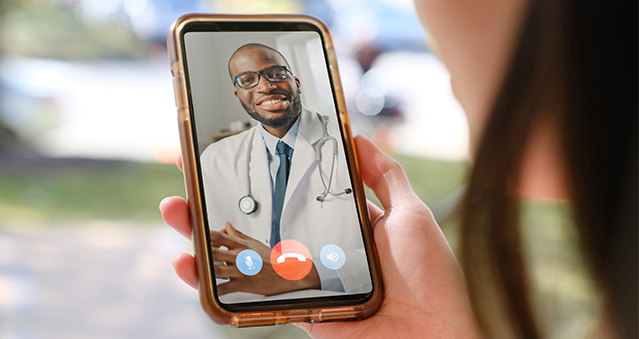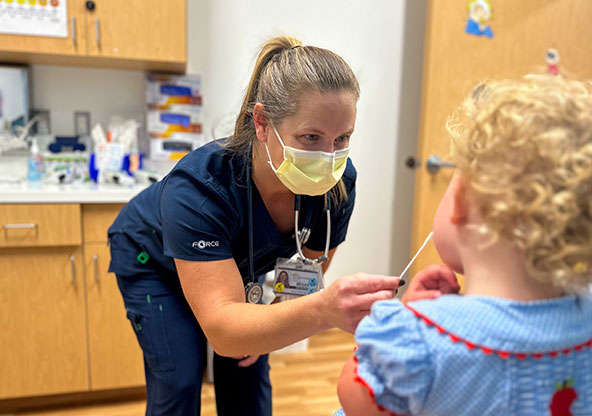When to Take a Baby with RSV to the Hospital
Note: Call your pediatrician immediately if you are concerned about RSV.
Respiratory syncytial, or RSV, is a common respiratory illness that infects the nose, throat, and lungs.
Adults often experience mild symptoms if they catch RSV. However, while RSV is not typically a serious health issue for most adults, it can cause severe infection in infants, young children and older adults with pre-existing conditions.
For the most part, in patients who are overall healthy, RSV presents as the common cold or a sore throat,” said William J. Pickard, D.O., primary care physician at CHRISTUS Trinity Clinic near Beaumont. “They typically don’t even get a fever. Patients are often unaware when they have it.
Get On Demand Care Right Now

See an urgent care clinician in under 30 minutes without the need to schedule a visit.
Get Care NowWhen Do Children Have a High Risk for Severe RSV Infection?
It's difficult for a parent without a medical background to know whether a child has a common cold or RSV. The reason is that RSV often has similar symptoms to a cold.
Most babies will recover naturally from RSV without complications.
The virus is common, and while sick babies may get a cough, congestion, and sometimes a fever, they will not need hospital treatment. However, it is essential to monitor them closely to ensure they can breathe and drink well.
RSV mostly develops in the lungs. Whereas a common cold usually affects the upper airway.
Your child should be okay if they are drinking fluids, have wet diapers or “good urine output,” and are breathing normally. But it's always best to talk to your pediatrician.
“Where we get concerned, where you really need to be concerned about bringing your child in, is when you notice the respiratory stuff, the harsh cough, the fast breathing, the difficulty breathing, when you take their clothes off, you see their belly breathing,” said Jason Harris, emergency medical director at CHRISTUS St. Michael Hospital.
“That's when you need to bring them in to be evaluated,” Harris said.
Emergency Care for RSV
Most of the time, you will recover naturally, and you can treat symptoms with over-the-counter cold medicines, anti-inflammatories such as ibuprofen, or fever-reducers like Tylenol.
However, in more severe cases of RSV, treatment will depend on what support a child or person needs. Because it is a respiratory infection, children might have trouble breathing. When you have inflammation of the small airways, it increases the risk of breathing problems.
In some cases, emergency rooms will use BiPAP machines, masks that people wear who have sleep apnea, or even a breathing tube and ventilator.
Find Emergency Care
Find an emergency room near you. CHRISTUS Health has emergency care in Texas, Arkansas, Louisiana and New Mexico.
Who Can Get RSV?
It's not just kids with underlying medical conditions that can get RSV. Even healthy children can get RSV and end up in a pediatric intensive care unit, said Niveditha Balakumar, a pediatric critical care medicine physician who practices at CHRISTUS Children’s Hospital of San Antonio.
Healthy babies with no prior medical problems can have trouble with the infection.
However, the most likely people to have severe cases of RSV are:
- Children under 12 months old
- Adults over the age of 80
- People with chronic medical problems
- Someone with an immunocompromised condition
Symptoms of RSV
RSV symptoms are similar to other upper respiratory infections, such as the common cold or flu:
- Coughing
- Sneezing
- Decreased appetite
- High Fever
- Runny nose
Some, all, or none of the above symptoms may appear in infants with RSV.
A cough of someone with RSV can sound either wet or dry.
But it is different from the croup cough, which is more of a “barking seal cough.” It’s also different from whooping cough, where babies cough repeatedly. With RSV, it can have a lot of mucus and congestion.
How to Stop the Spread of RSV
RSV can spread quickly because it is highly contagious.
If you are visiting family or friends and have RSV symptoms, you should wear a mask or try to avoid seeing them. This can be challenging around holidays and birthdays, but it is the right thing to do.
“It's just not worth it to get somebody a loved one sick when you didn't know what you had,” Pickard said. “The baby's immune responses aren't as good as ours.”
If you or your child has symptoms of RSV, it is best to stay home from work and keep your children home from school or daycare to stop the spread of RSV. Since RSV is a virus, it just needs to run its course, Pickard said.
However, Dr. Pickard said there is not enough evidence to suggest how long someone who is generally healthy should stay home. But because it is so contagious, wearing a mask is recommended. “I can't stress enough that if someone is sick, and they’re going to be around a baby, just try not to be around them or wear a mask,” Dr. Pickard said.
If you or your children are symptomatic with coughing, congestion and fever, you should stay away from other children, especially babies.
Don’t forget to wash your hands frequently. It’s best to consult your pediatrician for best practices.

